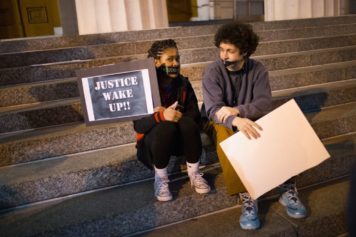
In a nation where the prison industrial complex has unleashed the most massive system of incarceration in the world, putting millions of Black men behind bars in recent years while the crime rate has actually been plummeting, asking about criminal history on job applications has effectively sealed off a generation of Black men from gainful employment.
When he signed the order on Friday, Virginia Gov. Terry McAuliffe acknowledged how much Black job candidates are impacted by questions about criminal backgrounds.
“We all know that this box has an unequal impact on our minority families,” McAuliffe said. “One study found that 34 percent of white job applicants without a record received a callback, while only 17 percent of those with a criminal record did. Among African Americans, 14 percent without a criminal record received a callback while only 5 percent of those with a record heard back from a potential employer.”
McAuliffe’s statistics illustrated the double whammy of racism and criminal convictions that slams Black ex-offenders.
McAuliffe’s order encourages private employers to follow the state’s example and “ban the box” as well. Major retailers such as Target, WalMart and Home Depot have already done so, according to ThinkProgress.
In addition to 14 states that have banned the box, about 60 municipalities have done so as well, including the District of Columbia.
About 70 million adults have arrest or conviction records, while 90 percent of employers conduct criminal background checks, according to numbers provided by the National Employment Law Project (NELP). In addition, about 700,000 people return to their communities every year after being incarcerated.
“Numerous research studies find that people require a combination of family support, community assistance, and economic opportunity to make different choices and stay out of the criminal justice system,” NELP said in a recent fact sheet. “Having access to employment opportunities is a critical component of this web of support. A steady job provides not just financial resources, but also connections to new people and behaviors and a motivation to remain out of incarceration.”
Men with criminal records account for a third of the nonworking men between the ages of 25-54, according to a New York Times/CBS News/Kaiser Family Foundation poll.
Not only does it help ex-offenders and their families tremendously for them to find jobs, it also helps the nation as a whole. The Center for Economic and Policy Research estimated that the difficulty of the formerly incarcerated to find jobs reduced the nation’s gross domestic product in 2008 by $57 to $65 billion.
Earlier this year, Georgia Gov. Nathan Deal also signed an order banning the box, which was one of the recommendations of his Council on Criminal Justice Reform. The council noted that in Georgia and most other states around the country, though a variety of programs had tried to help ex-offenders successfully return to society after conviction, the recidivism rates in Georgia and other states stubbornly remained at about 30 percent. An inability to find employment was a major reason these ex-offenders wind up breaking the law again.
In Virginia, agencies are still allowed to conduct a background check on a job applicant, but only after determining whether the candidate is qualified for the position.
“We should not seal the fate of every man and woman with a criminal record based on a hasty verdict,” McAuliffe said. “If they are eager to make a clean start and build new lives in their communities, they deserve a fair chance at employment.”


